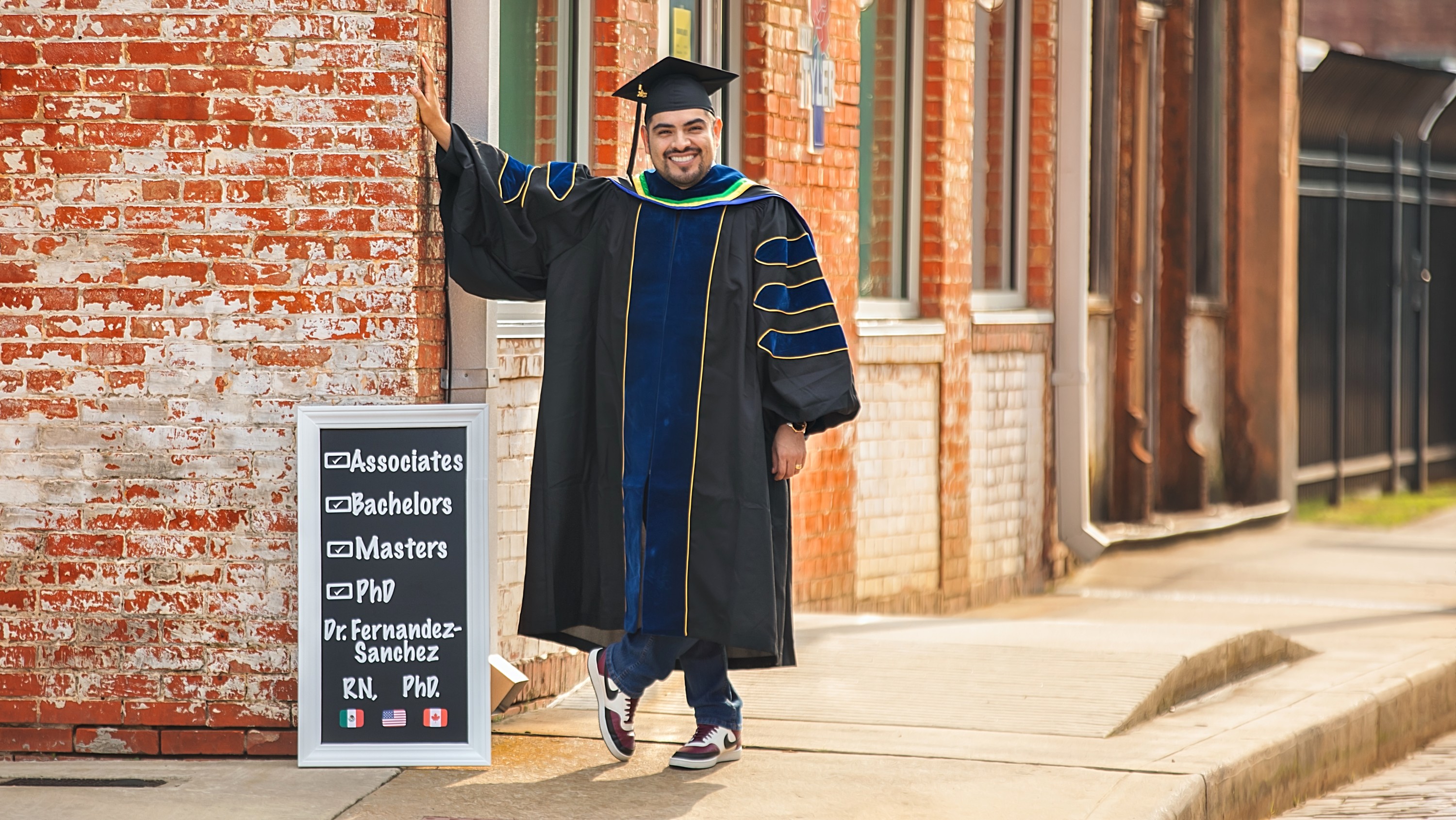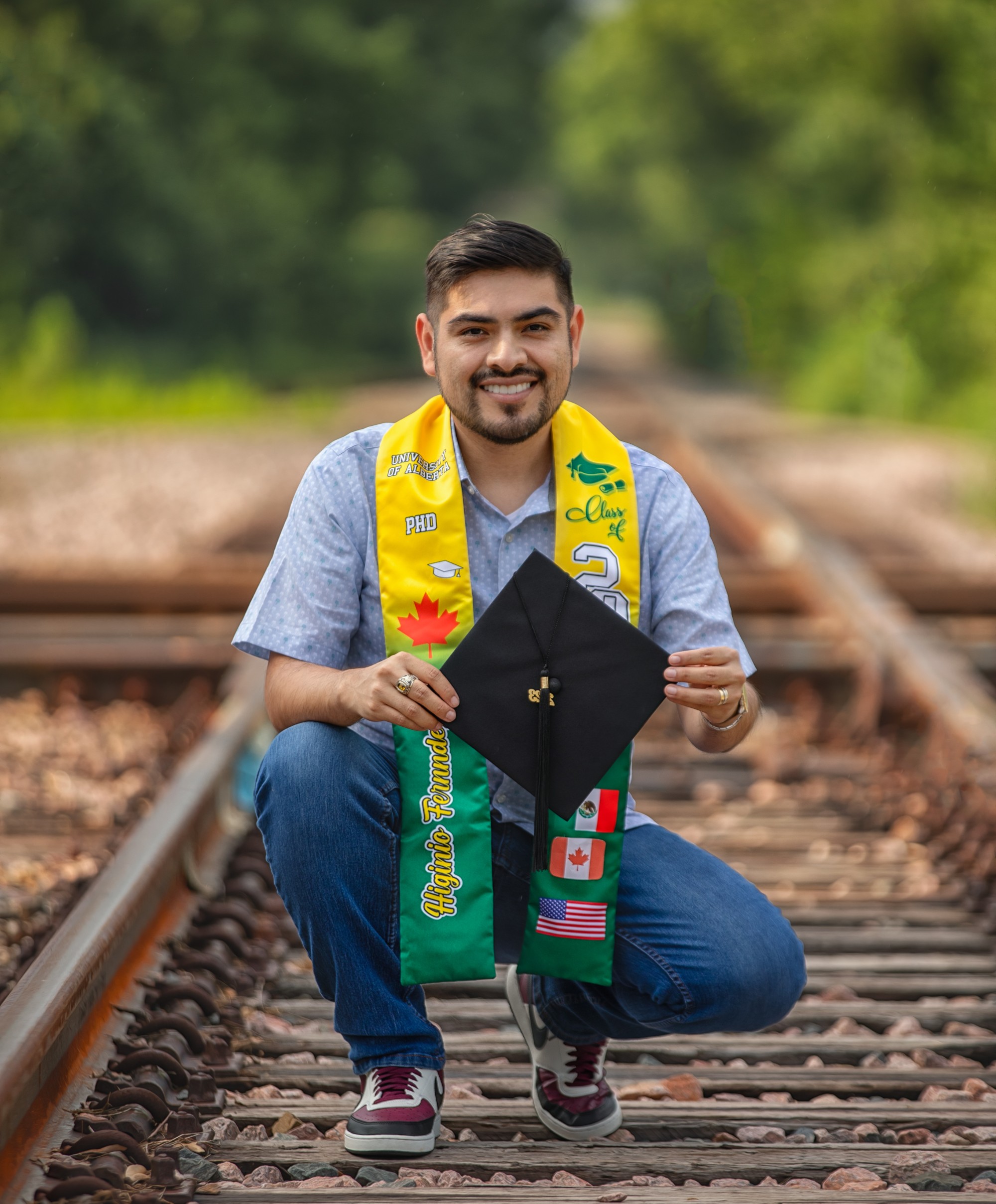Migration is at the heart of Higinio Fernández-Sánchez’s story.
The newly graduated PhD in nursing started out as an undocumented migrant himself, unable to register as a university student without the right immigration status.
What followed was a 16-year journey that took Fernández-Sánchez across North America (and frequently out of his comfort zone) in pursuit of an education. Now, fittingly, he is an expert in the health of Spanish-speaking migrants to Canada and the United States — and his journey has come full circle to the University of Texas, where he is now an assistant professor and postdoctoral fellow.
Fernández-Sánchez says he has never been the smartest student in his class, but he has always been disciplined.
“What’s always helped me is that if I want to do something, I go for it,” he says. “I’m willing to take a big risk.”
Life without status
As a five-year-old, Fernández-Sánchez moved with his family from a small Mexican town in Veracruz to Tyler, Texas, where his parents found work in the building trades and restaurants. They didn’t have American citizenship but it didn’t seem to matter much.
“Me and my siblings never really realized,” he remembers. “We just had a normal childhood with birthday cakes and summer holidays and just doing what kids do.”
At 15, it was disappointing to learn he couldn’t get a driver’s licence, but it wasn’t until he wanted to go to university that the lack of documentation became a problem.
Fernández-Sánchez wanted to pursue nursing inspired by a high school job shadow of a nurse practitioner. He remembers the caring and compassion his mentor showed for an elderly patient with poorly controlled diabetes, communicating through her granddaughter, who translated instructions from English to Spanish.
Fernández-Sánchez completed a college nursing course and then wanted to upgrade to a bachelor’s degree.
He applied, but the college counsellor told him he wasn’t allowed to register because he was an undocumented immigrant. She suggested he take his letter of admission to Mexico and apply to return to the United States on a student visa. She told him that another student had done that successfully.
So, against his parents’ wishes, at age 21 Fernández-Sánchez flew to Mexico for the first time since leaving as a child.
In February 2009, the U.S. consulate refused his request for a student visa because he had lived as an undocumented immigrant beyond the age of 18.
He was banned from returning to the United States for a decade.
“It was a really, really rough time for many reasons,” Fernández-Sánchez says. “I was Mexican but I didn’t speak Spanish well, I didn’t write well, I didn’t read well.”
A disciplined, determined student
Luckily, he had support from extended family and was determined to follow his dream of university studies despite the major change in location. He got a job as an emergency room nurse and practised his Spanish, bringing it up to university level.
At one hospital he met a migrant worker who had returned to Mexico with HIV and had transmitted it to his wife and youngest child. All three died.
“I knew something had to be done to address this,” Fernández-Sánchez remembers.
He got into Universidad Veracruzana and in 2013 graduated with his bachelor’s degree in nursing science.
While doing his undergraduate studies, Fernández-Sánchez travelled to Luxembourg for a research conference. Ironically, he was selected because he spoke English so well. At the conference, he met young nurses from around the world who were pursuing careers in research.
“I didn’t even know what a PhD was at that time,” he says.
Thanks to mentorship from those international peers and guidance from his professors, he continued his studies, earning a master’s degree from Universidad Veracruzana in 2016. When it came time to choose a placement for his PhD, one mentor suggested the University of Alberta because it’s one of the top nursing faculties in the world.
He was paired with Bukola Salami, now a professor of medicine at the University of Calgary, and assistant professor of nursing Jordana Salma as his supervisors. Both are experts in global health and community-based research.
The making of an activist
Fernández-Sánchez decided to focus his doctoral research on migration and health, inspired by his own journey and people, like an entire family affected by HIV, that he’d met along the way.
He interviewed women who stayed in Mexico while their spouses worked in the United States or Canada. As undocumented migrants, the men had limited access to health care in the host countries; when they returned, they brought home health challenges such as sexually transmitted infections, high blood pressure, diabetes, kidney disease and tuberculosis. The families often faced marital and mental health challenges following such long absences.
Fernández-Sánchez found that while some of the migrants returned through deportation, others came home “voluntarily,” due to poor health or a death in the family. He learned that the Mexican government offers support for deported returnees but limits it for other returnees and their families. Some of his research has now been shared with the Mexican government, and he hopes it will lead to policy change.
He also hopes to see host countries improve health services for migrants.
“If you prohibit migrants from things such as getting a COVID vaccine, then you’re going to have your ICUs full of people with COVID and complications of COVID, which is going to be more costly to the health-care system in the long run,” he points out.
During his time as a doctoral student at the U of A, Fernández-Sánchez was awarded the Vanier Canada Graduate Scholarship by the Government of Canada, the Consejo Nacional de Ciencia y Tecnología scholarship from the Government of Mexico, and a Graduate Studentship Award from the Women and Children’s Health Research Institute.
Fernández-Sánchez had just lost two family members when he moved to Edmonton to pursue his doctorate. He was struggling with his grief and feared it might overwhelm him. But that’s not how it turned out.
“I was kind of nervous moving to Canada with these feelings of loss, but actually it was almost like rehab for me going into my PhD — not only because of supportive peers and supervisors, but all the community and resources available to help me navigate through my grief.”
Salma, who praised Fernández-Sánchez for his resilience, says he, in turn, has become a talented mentor for other students.
“He will continue to be a good example of what it means to advocate for community and to engage in community-building while being a stellar scholar,” Salma says. “It’s that combination of action and knowledge production, which the world really needs right now.”
Fernández-Sánchez is now starting his new job at the Cizik School of Nursing. It’s located at the University of Texas Health Science Center in Houston, just a three-hour drive from Tyler, where the rest of his immediate family still live.
He is expanding his program of research on migration and health with a focus on gender and sexual health. He’s making research connections in the local community, like a shelter in Houston for child migrants who arrive at the U.S. border without their parents.
“I consider myself to be an activist. I’ve learned to advocate over and over and over for myself. And I’ve advocated for migrants and for women,” he says.
“Nowadays, I consider myself to be an intersectional activist. I am an ally for the LGBTQ community, for the Indigenous community, for people with special abilities — all of them affected by inadequate policies and a broken system.”

